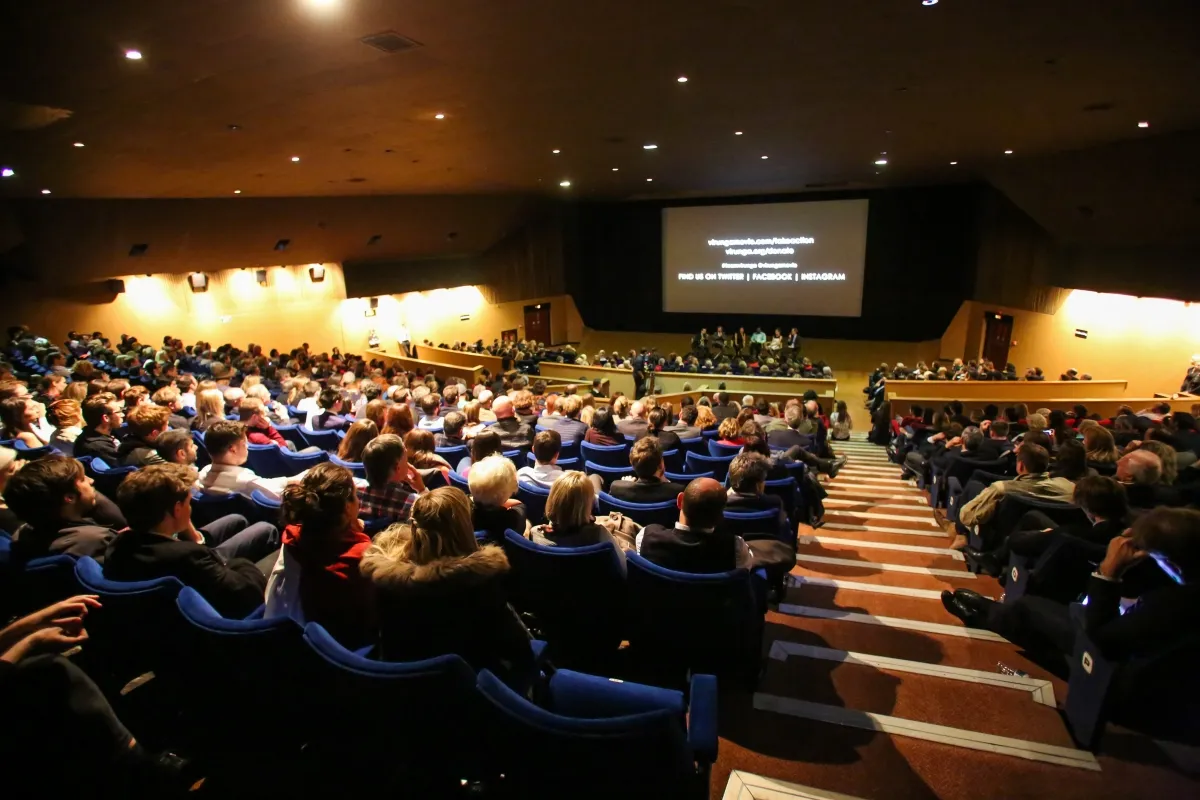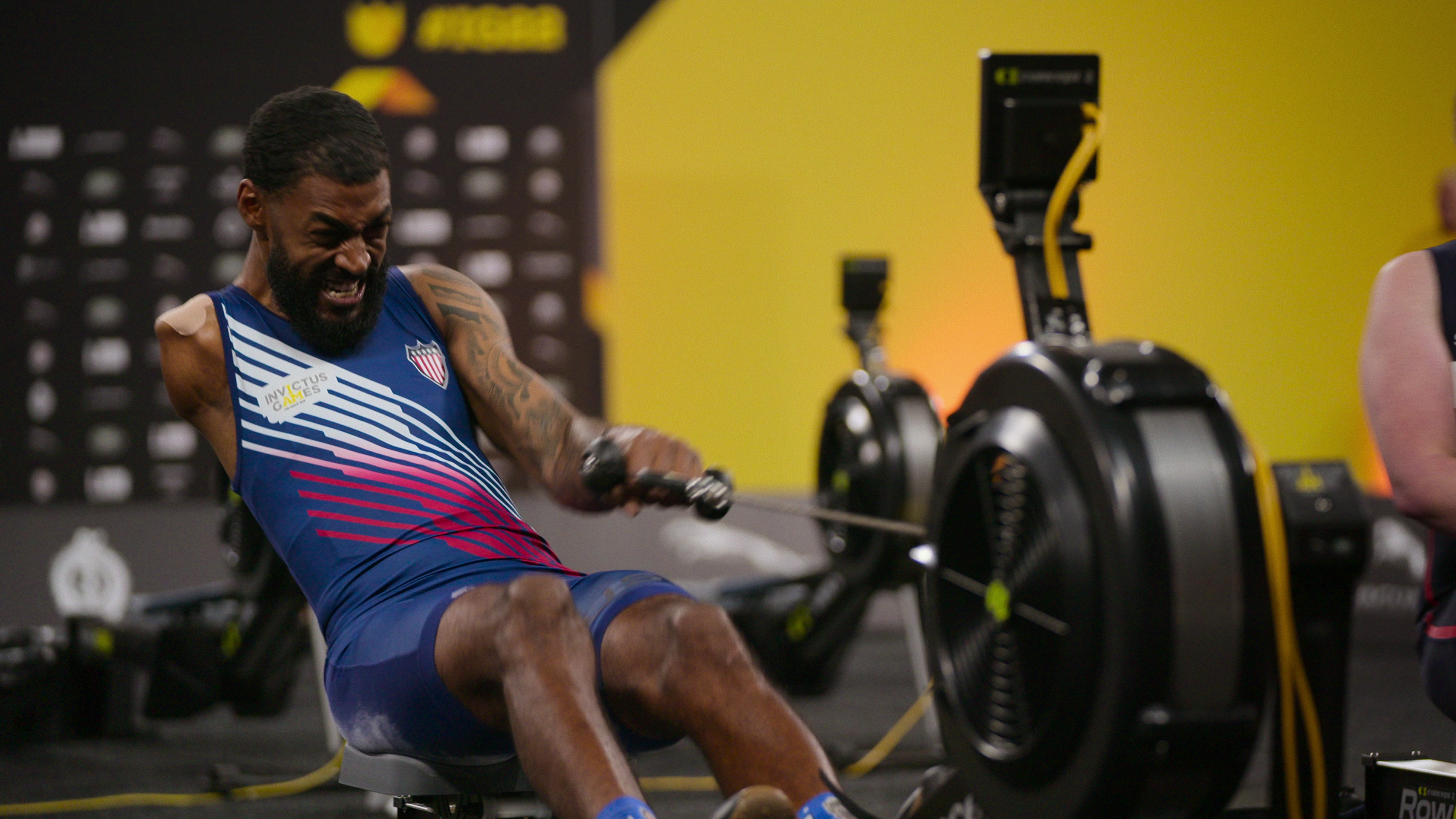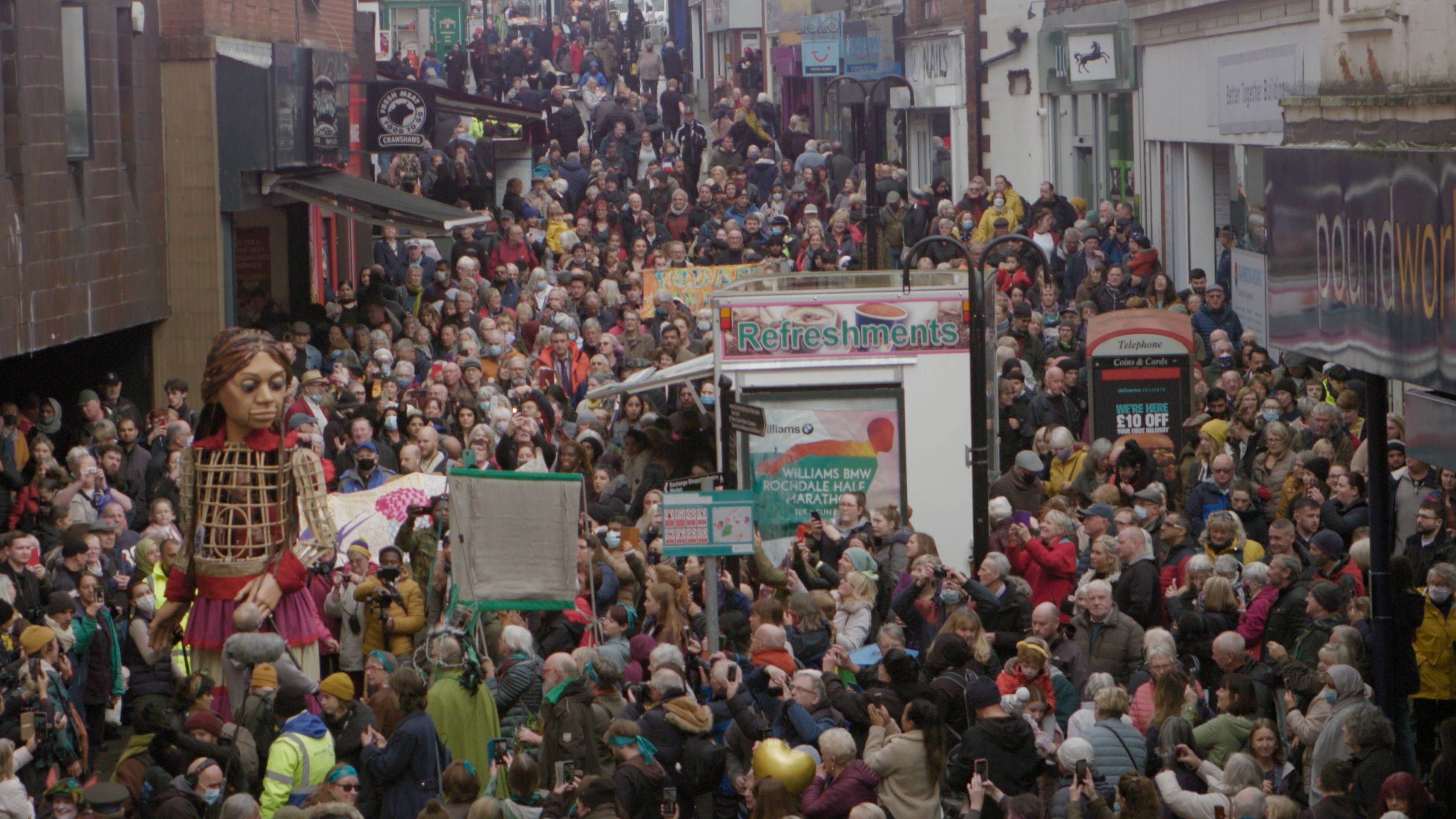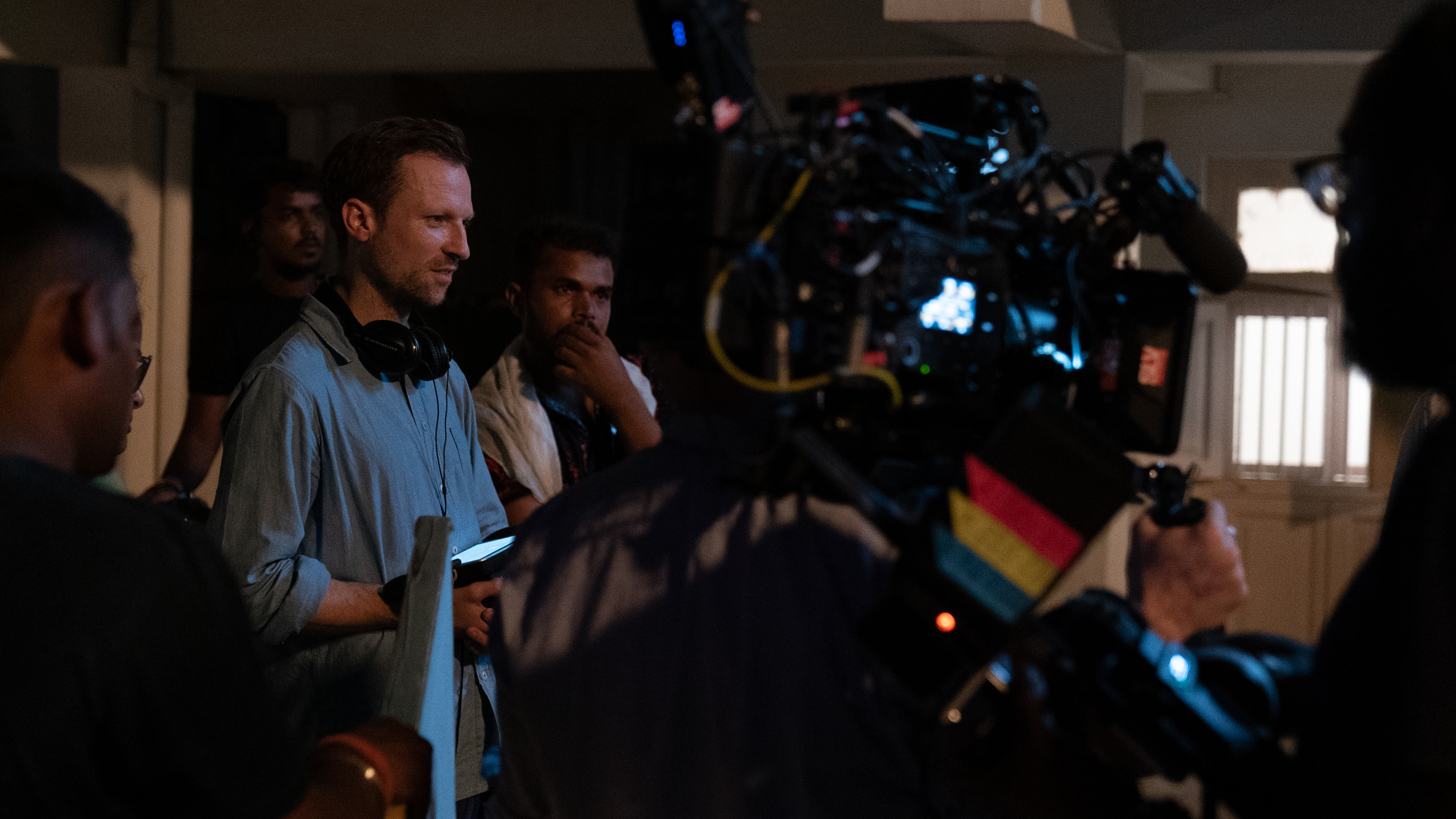

Photograph of the London premiere of Virunga. Image credit: Investec
Making a Production is Documentary’s strand of in-depth profiles featuring production companies that make critically-acclaimed nonfiction film and media in innovative ways. These pieces probe the creative decisions, financial structures, and talent development that sustain their work—in the process, revealing both infrastructural challenges and industry opportunities that exist for documentarians.
It’s a Monday morning in July, and most of the 14-strong staff of Grain Media are huddled together in its open-plan office in a former sculpture studio in Brockley, South London. It’s a weekly meeting to discuss progress across all of the company’s projects, including some 10 features in production and a host of development projects. The staff sit beneath a long narrow shelf heaving with awards—an Oscar, a BAFTA, and a Grierson are on display alongside many others. The awards are testimony to the quality of the films coming from this small indie, headed by 43-year-old Orlando von Einsiedel.
In the crowded landscape of UK documentary production, Grain Media is managing to steer a very difficult path. The company is completely independent and committed to making cinematic films about the issues of our day, films which they unabashedly hope will have an impact and improve the world. In a series of conversations with Documentary, von Einsiedel and his team candidly discussed the ways they work in a climate where budgets are getting much tighter and commissioners are increasingly risk-averse.
The company has worked with many different broadcasters over the years. Within its home country, Grain looks to place projects with a particularly British lens with the BBC. The 2018 BBC feature documentary Evelyn (available on Netflix worldwide) was a deeply personal film from von Einsiedel, exploring the lasting trauma of his brother Evelyn’s suicide on friends and family—and von Einsiedel himself—15 years on. The team brought their signature cinematic storytelling to the very personal tale, rigging a special camera to track the family’s walks through the United Kingdom.
The idea for Evelyn came from producer Joanna Natasegara, von Einsiedel’s frequent collaborator. Natasegara, who has her own production company, Violet Films, often produces with von Einsiedel directing. Their first collaboration was the eco-thriller Virunga (2014), which told the story of a group of courageous park rangers working in the Democratic Republic of the Congo. Von Einsiedel lived in a tent for months in the Virunga National Park, continuing to film as civil war broke out. The film won more than 50 awards globally, including a Peabody. Natasegara and von Einsiedel’s collaboration on the short Netflix film The White Helmets, which tells the story of Syrian civilian volunteers, earned their first Oscar, in 2017. Their most recent project is the recent five-part Netflix series Heart of Invictus (2023), made with the Duke and Duchess of Sussex.

The Beginning of Grain: Forging Long-lasting Relationships
As a professional snowboarder in his teens and 20s, von Einsiedel turned to video to make action films of his antics on the slopes. He soon took the camera around the world with his friends, documenting their journey and gathering sponsors on the way.
“You get a bit of extra money every time you’re on a video or a magazine as a snowboarder because you’re sponsored,” he said. “It created this incentive for me and my friends to all learn how to take photos and film each other.”
Von Einsiedel realized he enjoyed making media more than snowboarding, and pivoted to it as a profession. In 2006 he partnered with friend Jon Drever to set up Grain Media. By that time, von Einsiedel was following his passion to make documentaries about neglected regions of the world, while Drever’s focus was more on short-form comedy, branded content, and commercials.
A formative early film, which illustrates how von Einsiedel forges and establishes long-lasting relationships, is Skateistan: To Live And Skate Kabul (2010). The 10-minute film looks inside a skateboarding school that serves as a haven for both boys and girls. Its immediate online reception when von Einsiedel posted it to Vimeo was both astonishing and gratifying, and led to von Einsiedel focusing on positive stories from underreported areas of the world.
The film helped him recognize the importance of popular narrative storytelling when making films with a social purpose. “We found that sports are a great lens to explore much bigger themes. And also it’s a way to get the audience engaged. A film about kids in Afghanistan on the surface, that’s going to be quite dense material,” he said. “But a film about skateboarding kids in Afghanistan, suddenly that opens up a whole different set of people who might be interested. Then you can bury all the much more serious stuff that we really care about within that film.”
A decade later, when A&E approached the same Skateistan NGO about making a film, the organization’s leaders said they wanted to do it with von Einsiedel. With the film focusing on girls, von Einsiedel started a search for an appropriate director, landing on Carol Dysinger. The resulting film, Learning to Skateboard in a Warzone (If You’re a Girl), earned Grain a second Oscar for short-form documentary, in 2020.

The 2010 Skateistan film was also formative for one of Grain’s longest serving employees, Alice Martineau. Now 31, she first watched it as an 18 year-old, and began pestering von Einsiedel for work experience before she headed off to university. “I ended up coming along to do random stuff, like being in the art department and doing the playback operating,” she said.
After completing a degree in art history, Martineau returned to the company, and over a decade has risen from office manager to development producer. Grain, with its focus on creativity with impact, is her natural spiritual home.
During the pandemic, she was embedded in Birmingham’s Queen Elizabeth Hospital’s COVID-19 ward for two and a half months, making the Netflix film Convergence: Courage in a Crisis (2021). “There was the most intense moment on that. I was watching a lady dying from COVID and we were sat with her and her family for about like seven, eight hours, as she just kind of slowly passed away. There is a surreal sort of out-of-body sort of moment where you think, ‘Oh, wow, I'm really seeing this.’ And definitely we felt the sort of historic importance of capturing and honoring it.”
The original Skateistan film also led to a completely different film, when Freddy McConnell, a volunteer in the skate school, approached von Einsiedel saying that he wanted to make a film about trying to get pregnant as a trans man. Von Einsiedel and the team introduced Freddy to the filmmaker Jeanie Finlay, who featured him in her 2019 film Seahorse, which was made with Grain—it was a huge success on the festival circuit before airing on the BBC.
The Grain portfolio is a mix of projects that are generated internally by a robust development team, films brought to them by directors, and other combinations of matchmaking between commissioners, Grain, and the independent production community.
A recent matchmaking example is the Netflix documentary Scouts Honor: The Secret Files of the Scouts of America (2023), which has made the Netflix top 10 list in 13 different countries. Grain started working with Insight TWI, a longstanding, London-based production company focused on investigative journalism and human rights, on a film about the Boy Scouts abuse scandal. Netflix executives suggested a collaboration with Brian Knappenberger, who had made a short on a similar subject. The film, a co-production with Knappenberger’s company Luminant Media, and Insight TWI, was released in September 2023, with Knappenberger directing.

Grain is about to release the feature doc The Walk, directed by Tamara Kotevska (co-director of Honeyland, 2019). “I think we just had our fourth picture lock on Friday,” one of the film’s producers, Harri Grace, said at the staff meeting, getting one of many laughs of the day. The film explores themes around migration through the eyes of a young Syrian girl and a giant puppet, a project that originated as a theatrical installation.
The project came about after the creative team behind the theater project approached von Einsiedel about making a documentary. “I remember thinking, oh my God, there’s not enough time to raise the money to get this one to happen. As much as I love this, the timing is just so tight. It’s an impossibility,” he recalled. But, unable to resist, von Einsiedel began joining Zoom calls for supporters of the project. “I joined the Zoom calls and there were just people from all over the world, so much enthusiasm for the project. It kind of swept all of us along. Luckily we found Tamara Kotevska quickly and Tamara was also infected by that passion and said, ‘Yes, I'll just clear my summer.’”
The film is about to begin its festival run at DOC NYC. It’s been independently funded—including a sizable grant from the Ford Foundation—with Participant as a partner. “It’s a beautiful, extraordinary film, but we’re nervous about trying to find a sale for it,” says von Einsiedel. “We’ve got great partners, but after Sundance, we’re all nervous about how it’s going to sell. Nothing sold at Sundance [in 2023].”
A Difficult Climate for Docs
Indeed, the current climate in documentary is tricky, and makes everyone nervous. Grain is finding things difficult across all spaces in commissioning. “Disney’s just gone through this massive upheaval. So, they haven’t been commissioning lots of feature documentaries in the last three to four months,” said von Einsiedel. “And Netflix, who is one of the main players in this space, they’re doing less and less of the riskier observational films. I get it from their point of view, they know that observational narratives can’t be guaranteed, and that eyeballs are more likely to be on a certain type of film. But, you know, that’s tough for the filmmakers that make long-form observational vérité films.”
Grain’s operations director, Adam Mitchenall, says they have seen a real cooling down among postpandemic commissioners. He’s had a surprising number of freelancers recently come knocking at his door. “In the last week, two editors that we work very closely with have said, ‘We would love to pick your brains about how to network.’ These are people who are usually booked out.”
A number of recent reports confirm the dire state of the UK documentary production sector, with industry watchdog Bectu reporting an “unprecedented lack of work.” The slowdown in the UK has been caused by a perfect storm of factors, including a significant reduction in TV ad spending, the freezing of the BBC license fee, which has led to a slashing of spending, and a narrowing of the factual content that streamers are willing to commission. A recent Broadcast article quotes an anonymous commissioning editor: “The industry at large is dealing with a big set of issues: the cost-of-living crisis and huge inflation. Everything is costing more than it did this time last year—every single production—but the money hasn’t gone up.” Unlike other dry spells, the slowdown shows no sign of letting up soon, according to these reports.
Mitchenall adds that when commissions do come through, commissioners are also keeping a closer watch on production costs, limiting the number of filming days.
In difficult times, the company is resorting more and more to a hybrid funding approach to get their films made. This is generally funding a film by thirds, according to von Einsiedel: “One third is funded with UK tax credit and grants that we can apply for. That ranges from Sundance and the BFI and all the different grants in between.”
The second third comes from equity, such as loans from high-net-worth individuals. “They’re not giving us that money as a grant,” said von Einsiedel. “They're giving us that money as equity that they absolutely expect to get back. But they’re doing it also because they believe in the film, they believe in the story, and they believe the potential impact that the film could have on that issue.”
The last third comes from a sales agent, giving money upfront in exchange for taking on the film afterwards. Von Einsiedel said they have three feature docs in production following that model, including The Walk.
According to Mitchenall, this hybrid approach comes at a cost: “It means we can quite quickly get up and running on things but to actually complete the full budget on things is difficult.” Understandably, the company prefers a more straightforward single commission. “The nice thing about a streamer is knowing you’re here for a year or a year and a half,” said Mitchenall.
Mitchenall was brought in eight years ago to work on the company’s brand consultancy. The company used to spread its output between commercial work, comedy, and documentary. These days they have narrowed to documentary output, after the departure of founding member Drever six years ago. “We sort of grew apart creatively,” von Einsiedel said of Drever’s departure. “There just came a point where it made more sense for him to leave, to focus on what he was doing.”

Grain no longer produces the high-energy brand work that was a staple of their early output. “To actually chase that work, there’s very specific sets of relationships that you need,” said von Einsiedel. “And you need to be in tune with the advertising agencies and all that other stuff. We’ve moved away from that, so we don’t have that bread and butter.”
“We realized it wasn’t possible keeping doing a lot of jobs for 10, 15k budgets,” said Mitchenall.
The company still produces branded content that is more in alignment with their documentary storytelling USP, such as a recent series on Nobel Prize winners. “Brands have always been interested in telling their stories,” says Mitchenall. “What’s been helpful is that we’ve had a few successful go’s in it. We’re able to say, ‘I’ll make you this documentary—we won’t say your brand name every three minutes throughout, but it will bring a different audience to it.”
For documentary companies everywhere, relationships with commissioners and broadcasters can make or break them. A trend Grain has noticed in recent years is for development to be quite advanced, only for changes at the broadcaster resulting in no greenlight. Such was the case for a lengthy development for a musical-themed idea for a streamer.
The company also used to make series for Al Jazeera, but significant work has dried up as key staff at the broadcaster changed. “Just getting things commissioned is harder,” acknowledged Mitchenall. “The hoops to jump through feel bigger. There are quite a few projects we’ve taken quite far down the road only for commissioners to lose their jobs or change jobs.”
Their focus these days is on trying to develop series that will provide some guarantee of income over many months. After building up a reputation for shorts and features, the company has had to earn the trust of commissioners for series. “They’re all story based and they require the same skills in terms of filming and telling stories,” said von Einsiedel. “But to actually pitch and win them, the networks are looking for different things [than features]. So we’re learning, and we’re getting better at it.”
Grain’s creative director, Anna Murphy, said that they are really focused on the human moments in their storytelling when pitching. “When we pitch, people say they want something as serious as Virunga. But actually, they don’t,” she said. “If we come up with series that are incredibly ambitious and journalistic, they don't really go anywhere. So, we’ve decided to also explore the just genuinely incredibly heartwarming.” Case in point is one pitch focusing on a real-life beauty specialist competition. In a development meeting after the main staff meeting, the team discusses the need for the deck to have a series of “Oh” moments, to match the tagline: “It’s the Olympics, but with more ‘ohhhhh.’”
In the staff meeting, Murphy recounted how a commissioning editor to whom they were planning to send an interactive deck made it clear, in a passing comment, that they didn’t in fact like interactive decks. “We’re always trying to work out a kind of format beat sheet and how to present that to our commissioner,” said Murphy. They had landed on the idea of an interactive deck to demonstrate the multiple story beats. “We’re just going to work out two options that are going to be great,” said Murphy with a laugh. “That’s just the joy of development.”
A Hub Within the Company
Exec Producer Chloe Leland reported in the staff meeting how a social issue–focused feature doc for a major streamer was shaping up. The film is an environmental story shaped into a mystery narrative, designed to capture an audience who wouldn’t normally be drawn to environmental stories.
The film has been in the edit for a few weeks. “The editors have said that there is not one character that you wouldn’t want to watch an entire film about,” Leland reported to the team in the staff meeting. “We’re at that stage where everybody’s really buzzing.”
The film will be the first feature release developed by Grace Labs, a hub within Grain which Leland heads as creative director. Grace Labs was founded, with the financial support of private philanthropist Jorge Villon, to develop projects focused specifically on climate and biodiversity. It’s set up as a separate hub within Grain Media for financial transparency, so that Villon can see exactly where his money is going, according to von Einsiedel.
Before coming to Grain four years ago, Leland had been creative director at Nutopia. She had all but given up on returning to television after time off, until she was asked to interview with Grain. “I came and met these guys and you walked in the door and didn't feel ashamed of saying, ‘I want to make a difference.’ It sounds a bit culty, but we all really believe in the films we’re making. I don’t think there’s one film on our slate that we all don’t believe has a purpose. So it keeps us really motivated.”
The ethos of Grace Labs is to tell compelling human stories that subtly have an environmental narrative embedded within them. Or, as von Einsiedel relayed, a commissioning editor called it “chocolate-covered broccoli.” Leland described the films as “the antidote to apocalypse fatigue and eco-anxiety. They’re supposed to make you want to act and believe that things are already happening that are changing the way that our future is going to be.”

Guarding Independence
Von Einsiedel says that over the years they have learned when pitching to mask the important social and environmental issues within their films. “It comes from bitter experience from being in meetings with networks when we sort of frame it as an important environmental story and their eyes glaze over,” he said. “Anything that is pitched as an important issue is so not what they want.” Instead, they pitch films as a more recognizable and audience-pulling genre, such as a thriller or a conspiracy film.
Pitching, and developing the sizzles that will greenlight projects, has become a huge time and financial sinkhole for the company. ”We’ve noticed a massive shift. It’s much harder to get projects commissioned,” said von Einsiedel. “I definitely think with the kind of films that we make, there’s always been an extra mile to prove that that film and that story to networks. But we found that that’s become so much bigger.”
He said that you used to be able to approach a network with a teaser for a vérité film and understandable uncertainty about the final content of the film. “We have found the conversations that we’ve been having in the last six months have been no, we don’t just want to see a teaser. Anything that is not really obviously mainstream, the networks expect us to basically show them a film so that all the risk is taken out of it,” said von Einsiedel. “Almost like we’ve gone and spent six months already filming it. And so the sizzles, they’re becoming more and more in-depth and more and more expensive to make because they require us to spend weeks.”
The company has had to find other funding to just get the film into the kind of state it needs before they can take it to the bigger networks. For example, a foundation funded a recent development shoot about a critically endangered species, allowing the team to put together a heartstring-pulling sizzle. “We’re trying just to make loads of love stories,” said von Einsiedel with a laugh.
“Through those love stories, you slip in some of your messages,” says Leland. “Oil is threatening this species’ main habitat. So there’s all these stories that come into play; there are all these impact levers that we are constantly pulling.”
The company pulls von Einsiedel into projects when it makes sense, but has to choose sparingly. On the day of the staff interview, they’d got him interviewing an extreme sports athlete for a sizzle tape that will be about the end of the athlete’s career. The team was meeting the athlete after months of discussion, bringing him in from Paris for the day. They were shooting next door at an artist’s house that belongs to another of Grain’s extensive friends-and-family network.
For Heart of Invictus, von Einsiedel directed all five episodes. “You're running five separate edits and it’s very all consuming,” he said. “But the people we ended up focusing on were just extraordinary and they’ve gone through incredible difficulties in their lives. And it’s just very moving when you follow people who are having to make very difficult choices.”
With all the stresses in keeping staffers employed, many small indies in the UK have sold their independence to a super indie, paving the way for more stability. With a shelf heaving with awards, surely von Einsiedel has had offers?
“We’ve had a few approaches over the years,” von Einsiedel admitted. “I think it's quite hard for people to actually understand that social-purpose filmmaking is our entire reason to exist. That’s why we all get out of bed every morning. It’s always felt in the end that the partnerships that have come to us haven’t ever felt right. If we had gone down that path, we would have just become a machine.”
As the Monday morning meeting winds down, staff migrate to the attached kitchen, where a weekly delivery of food has just been stashed. Several of the staff have young children, and the conversation drifts to what happened on the weekend. Lunch is provided for free, an incentive to lure them to the outskirts of London, said von Einsiedel, who grew up nearby. But it’s clear that for now, there’s nowhere most of these devoted filmmakers would rather be.
Carol Nahra is a documentary journalist and lecturer. She teaches documentary and digital journalism at several London-based institutions, hosts the Bertha DocHouse podcast DocHouse Conversations, is the lead trainer for the Grierson DocLab, and is a trustee for One World Media.




